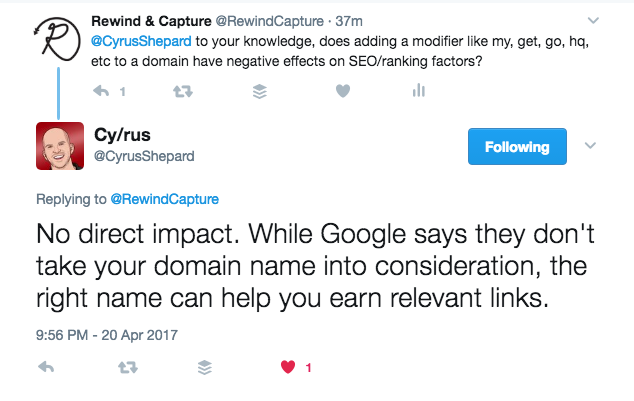Just before you are about to fall asleep, you think of a catchy name for your next venture. You go to choose a domain name, like yourcompanyname.com, and you find that it’s already registered. You shut your laptop, go back to bed and wake up in the morning thinking “what now?”
One option is to choose a different domain extension for your domain. For example, that .com is taken, but companyname.online or companyname.net or companyname.co may be available. In the early days when domain name purchasing was first available to the public, only a limited number of extensions were available: .com, .net, .edu, .org and a couple others. Now, that has changed and there are literally hundreds of domain extensions to choose from. So, you could choose a different domain extension, but there are downfalls. Not owning the .com could potentially reduce your credibility in the marketplace because we’ve all come so accustomed to it.
But what if you really want a .com extension for your domain name and someone already has it (and you don’t have the resources to purchase it from them)? In that case, a little creativity is needed.
One approach we have seen thousands of companies use to secure the .com is to use a prefix or suffix in their domain. What’s does it mean to add a prefix or a suffix? It means finding a short, relevant word or acronym and inserting it before or after your brand name.
Here are three examples of companies you may recognize that have done exactly this:
- The popular small business customer relationship management (CRM) platform Highrise purchased highrisehq.com. We have found that the hq suffix is a popular one for .com domain names. It’s short, easy to remember, and it doesn’t typically detract from the impact of the core brand name itself

- Logitech went a different route; they selected a prefix for their popular Harmony brand of products, which can be found at myharmony.com. This simple, easy to remember prefix works well for companies operating in either the B2B or B2C space because typically the user is logging in to their account or their dashboard, etc.

- Have you ever used Gogo’s inflight wifi service? Their domain is gogoair.com; they attached a suffix of “air” to their company name. Not only did it enable them to get a great domain name, but choosing the suffix of air mentally connects their domain name with their customer and market strategy, suggesting they connect you to the internet in the air.
In exploring this approach, the opportunity for creativity is nearly boundless. Here’s a list of five thousand prefixes and suffxes that you may want to consider as you are exploring your options.
How does this approach affect SEO results for those domains? The jury is still out, but the ramification, if any, is likely minimal and not something you should lose any sleep over.
In all, there are over two hundred ranking factors that Google and other search engines analyze to determine what site is most relevant to a specific query. If you are concerned about SEO, you should focus more on building 10x content, that organically earns quality backlinks.
Choosing a domain for your website is an important decision, and unfortunately for most founders, their first choice isn’t available. Using a modifier like a prefix or suffix can help founders scratch one item off their to-do list.
If you already have a shortlist of brand names, try running them through Rewind & Capture’s naming tool to see how they score. If the .com is not available, it’ll automatically recommend available .com’s containing prefixes and suffixes.
What prefixes or suffixes have you noticed most in domains most? If you have any questions about this domain strategy, drop us a comment below!
A veteran of both startups and the enterprise, Chris has a deep track record in developing customer community and evangelist programs for brands such as Adobe, H&R Block and Aruba Networks while holding executive positions at Ant’s Eye View and Edelman Digital, and he was co-founder and CEO at Cerado. He currently lives in the Bay Area with his family.







[…] very clear here. Are you only interested in available .com domains? Are you ok with a modified domain? I purposely requested a .com vs a .org to really test the creative engines behind the […]